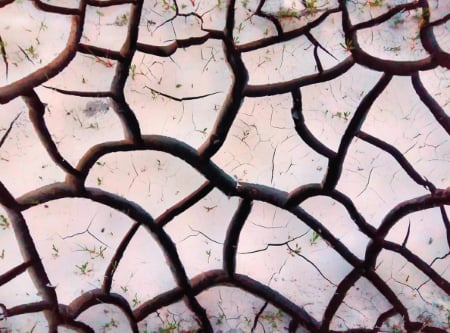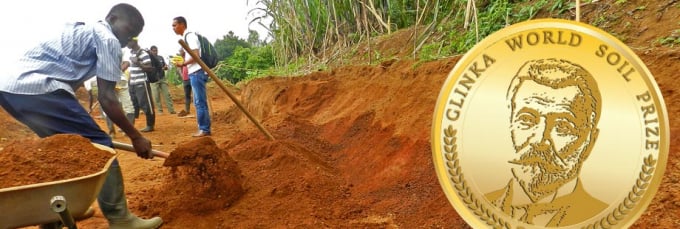June 21, 2025 | 01:21 GMT +7
June 21, 2025 | 01:21 GMT +7
Hotline: 0913.378.918
June 21, 2025 | 01:21 GMT +7
Hotline: 0913.378.918

The effects of soil salinization in Nigeria. Photo: FAO
As it marks World Soil Day, the Food and Agriculture Organization of the United Nations (FAO) has highlighted the threat posed by soil salinization to global food security and warned that many countries still lack adequate capacity for soil analysis.
“Soil is the foundation of agriculture and the world’s farmers depend on soil to produce about 95% of the food we eat”, FAO Director-General QU Dongyu said. “Yet, our soils are at risk,” he stressed in remarks ahead of the December 5 event on the theme: “Halt Soil Salinization, Boost Soil Productivity”.
Among the critical issues are:
Unsustainable agricultural practices and the overexploitation of natural resources as well as a growing population are putting increased pressure on soils and causing alarming rates of soil degradation globally.
Over 833 million hectares of soils worldwide are already salt-affected, as shown on the Global salt-affected soils map launched by FAO in October.
Estimates indicate that more than 10% of cropland is salt-affected, which poses a major risk to food security worldwide.
Some of the worst affected regions are in Central Asia, the Middle East, South America, North Africa and the Pacific.
The management of salt-affected areas demands an integrated approach, embracing sustainable soil and irrigation and drainage management, the selection of salt-tolerant crops and plants including halophytes, which are able to grow well in such environments.
Collecting soil data and building sufficient capacity in the soil laboratories of FAO Member countries is essential to manage soil-affected land resources and pave the foundation towards digital agriculture in the future.
The Director-General underlined the importance of generating reliable soil data as he announced the official launch of the Global Soil Laboratory Assessment Report. A joint effort by 241 laboratories in 142 countries, it is led by FAO’s Global Soil Partnership (GSP) and its Global Soil Laboratory Network (GLOSOLAN) composed of more than 760 laboratories worldwide.
The Report highlights the challenges, with 55 percent of countries surveyed lacking adequate analytical capacities, including human resources, harmonization procedures and equipment. Many are unable to meet the national demand for soil analysis in Africa, Asia, and Eurasia.
Qu stressed the importance of continuous investment in soil laboratories to provide reliable data on which sound decisions can be made to ensure sustainable soil management and prevent soil degradation. He added that the cost of inaction in maintaining and restoring soil health can have dramatic consequences for the UN’s sustainable development agenda.
FAO-led initiatives include a Global Soil Information System (GloSIS) and a newly-launched Global Soil Biodiversity Observatory, which will contribute to the global monitoring network and the forecasting of soil health.
The COP26 highlighted the vital role of healthy soils in climate change mitigation and adaptation and in building resilience. And FAO has called on all countries to urgently improve their soil information and capacities by making stronger commitments towards sustainable soil management.
The European Union’s (EU) recent adoption of a new Soil Strategy, is a positive example, setting concrete and ambitious targets to improve soil health within and outside the Union, Qu said.
As part of the World Soil Day celebrations, prizes funded by Russia and Thailand are being awarded for outstanding contributions to this field. Russia’s Glinka prize was given to soil scientist Lydie-Stella Koutika from the Republic of the Congo, with over 40 years of experience in research on agroecosystems. Thailand’s King Bhumibol prize went to the Nigeria Institute of Soil Science (NISS) for raising awareness on the importance of healthy soils and the achievements in this field.
FAO’s work on soils
You can find out more on the FAO’s work on soils here, including the Global Soil Partnership (GSP), which helps develop collaboration and synergy among a range of stakeholders, from land users to policy makers. One of the key objectives of the GSP is to improve soil governance and promote sustainable management of soils.
Among its main functions are: the regular production of the Status of the World’s Soil Resources report; the development of soil information and data at all levels, supported by the development of digital soil mapping capacities in developing countries; the establishment of national soil information systems; the development of tools to enhance soil health and prevent degradation and the scaling-up of good practices on the ground; the creation and coordination of technical networks and advocacy for sustainable soil management.
The Glinka World Soil Prize

The Glinka World Soil Prize aims to keep up the momentum generated by the International Year of Soils 2015. Photo: FAO
The award comes in the form of a USD 15 000 check and a Glinka gold-plated medal. It contributes in a timely manner to raise awareness amongst policy makers and the general public about possible solutions to tackle acute national and local problems of soil degradation, and to encourage all stakeholders and soil practitioners to engage in field-oriented work, with direct contributions to the preservation of the environment, food security and poverty alleviation as specified in the Revised World Soil Charter.
(FAO.org)

(VAN) Poultry production in Poland, which has only started recovering from devastating bird flu outbreaks earlier this year, has been hit by a series of outbreaks of Newcastle disease, with the veterinary situation deteriorating rapidly.

(VAN) Extensive licensing requirements raise concerns about intellectual property theft.

(VAN) As of Friday, a salmonella outbreak linked to a California egg producer had sickened at least 79 people. Of the infected people, 21 hospitalizations were reported, U.S. health officials said.

(VAN) With the war ongoing, many Ukrainian farmers and rural farming families face limited access to their land due to mines and lack the financial resources to purchase needed agricultural inputs.

(VAN) Vikas Rambal has quietly built a $5 billion business empire in manufacturing, property and solar, and catapulted onto the Rich List.

(VAN) Available cropland now at less than five percent, according to latest geospatial assessment from FAO and UNOSAT.

(VAN) Alt Carbon has raised $12 million in a seed round as it plans to scale its carbon dioxide removal work in the South Asian nation.